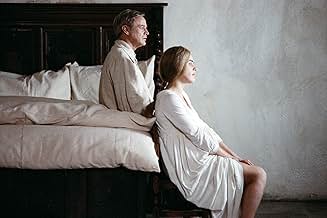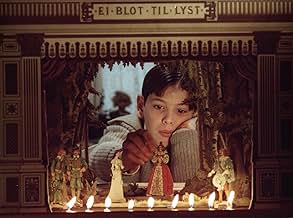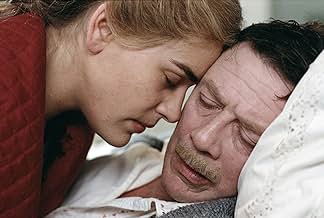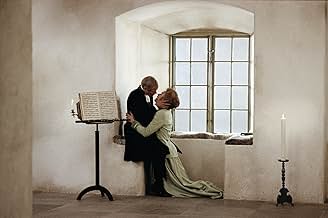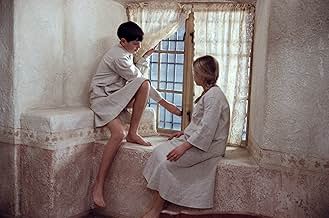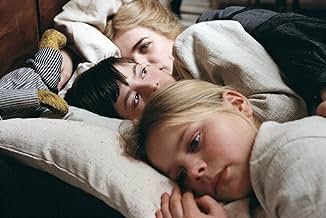Deux jeunes enfants suédois vivent les nombreuses comédies et tragédies de leur famille, les Ekdhal.Deux jeunes enfants suédois vivent les nombreuses comédies et tragédies de leur famille, les Ekdhal.Deux jeunes enfants suédois vivent les nombreuses comédies et tragédies de leur famille, les Ekdhal.
- A remporté 4 oscars
- 25 victoires et 13 nominations au total
Patricia Gélin
- Staty - Ekdahlska huset
- (as Patricia Gelin)
Avis en vedette
10ColeSear
This film could never have been made in the United States. I realize when it was made Bergman had been around for a long time and had his own clout but it still has too much of a philosophical slant to be mainstream here. This film is amazing. The first hour moves at a slow pace but it really sets up the rest of the movie well and then it really picks up. The cinematography is breathtaking and while this story makes you think a lot you don't feel ambivalent towards the characters through the rest of the first film after having been slowly introduced to all the characters you have a certain identifcation that is purely emotional and blends wonderfully with the other aspects of the film. It's truly great and should be considered one of Bergman's best works.
As Ingmar Bergman's "swan song" (which wasn't necessarily the case once After the Rehearsal and the recent Saraband were released), Fanny and Alexander was a film I saw many months ago, in its truncated, 3-hour version. I knew I had witnessed something special, something life-affirming, and above all a work that contained enough poetry, passion, and humanity for two movies. But I also felt as if there was something missing here and there. So, once the complete TV version was released, as with Scenes from a Marriage, I jumped at the opportunity to view it in its entirety. Broken up here into 5 Acts, Bergman takes another semi-autobiographical approach to his storytelling, and it's a sumptuous tale of a turn of the 20th Century family (the Ekdahls, comprising of Oscar and Emilie, the parents, Fanny and Alexander, the kids- Alexander being mostly the driving force behind the story- and also the other relatives Carl and Gustov Adolf, brothers of Oscar, Helena, Alma, Lydia, and also the housemaid Maj) who own a theater company.
What makes Fanny and Alexander work as a major achievement, if anything else for my money is that all the elements seem balanced out over the acts, with story and characters, each sharply defined. The first act unfolds with attention to the little details and the more prevalent ones in a family gathering. A key speech made by Oscar is a haunting bit of foreshadowing before they set off for the family dinner. This scene, involving more or less two dozen people, is sometimes very funny, sometimes a little unnerving, and towards the end depressing. But scenes such as these reveal how wonderful and exciting Bergman can be with his material and actors- despite it taking place in 1907, you can see these people in modern settings just as easily. There's also the scene involving Oscar with his children before they go to sleep, in which he tells them a story, which ranks as one of the more memorable, touching scenes of the film - from here, we can understand how this brings to Alexander (Bertil Guve, in a performance that is touching by being so straightforward with the innocence of child-hood) to the state he's in for much of the rest of the picture.
Then the second and third acts come around, and the tragedy unfolds as penetrating as I've seen in any film, much less from Bergman. It wouldn't spoil it to say that Oscar succumbs to an illness, and passes away. From here, Emilie (Ewa Fröling, a performance meant for Liv Ullman, which she fits just as well) tries to go on as usual, and it just doesn't feel the same. She seeks counsel from the village bishop, Edvard Vergerus (Jan Malmsjo, previously in Bergman's Scenes from a Marriage), and subsequently falls in love with him, or at least thinks she does. They get married, and the children are forced into leaving (almost) everything behind to live at his dreary, caged residence, a far cry from where they once lived, a place lush with colors and life in the rooms. Both of these assets are provided by an Oscar winning production design team, and the foundations of how these two, including as well the theater, display how period-perfect some of this can be.
The last two acts are when things get rough, which is a standard Bergman is known for. This kind of standard, if I could call it such, includes his personal connection to the Christian church, in particular with his father being a Lutheran priest. I'm not guessing on how fact based Bishop Vergerus is to Bergman's life, and I really don't want to either. One of the things I loved about the film (than some likely hated on it's original release- I know, for example, that my father was devastated after watching this film) is how the good and the bad, or what could be seen as good and bad, are paired off, and how the middle-ground is just as clear or un-clear. Emilie is a good person, wanting the best for her children and for herself, but she doesn't know how to do that without someone to bring guidance when she cannot after grieving for her dead husband (who appears sometimes to Alexander, which is another matter). Alexander, who is a child raised with all the enthusiasm to express himself as such by his uncles and particularly his theatrical father Oscar, is good but lending himself to not being too firm on what's real and what is not.
The Bishop, on the other hand, is one who, as he says at one point "has only one mask". His is a puritanical approach, who sees imagination in only one strict aspect, and has terms of love that are by his code of living and understanding of people. Veregus, along with his family that live in fear and suffering (Harriet Andersson's character, and with the character of the heavy, ill aunt), know little is anything about how the Ekdahls have lived. What ends up happening, even from the get-go of the third act, in the fourth and fifth acts Bergman reveals Bishop Veregus to be an immense antagonist, one that allows just enough sympathy in one or two spots to not throw something at the TV, but with the kind of language that only the most terrifying of movie characters possess. Bottom line, this character, whether you like the film or not, is one of Bergman's greatest creations, and is pulled off by Malmjso with icy, disturbing perfection; it's one of the most memorable of the kind in film I can think of, right up there with Nurse Ratched, HAL 9000, and Darth Vader.
But what torment and anguish the characters, as well as much of the audience, seem to endure in the fourth/fifth acts; there also comes revelatory moments of sheer beauty and enchantment. A couple of scenes involving Alexander in the puppet shop, for example, display a level of artistry that goes between Bunuel and Disney. And a particular, long soliloquy by Isak (Erland Josephsson, not under-used at all) to the children is a poem unto itself that gives me an idea that Bergman had he not gone into theater and film, would've been one of the great poets of the 20th century. As the catharsis comes, it comes with a kind of justice that works in the only way it satisfyingly could have. With the fates of the Bishop, Emilie, and Alexander and Fanny brought to a close, as with the Grandmother, the uncles and aunts, and so on, it's all very symbolic, metaphorical, and real, and it gels together.
One last note- Sven Nykvist, who one his second Oscar with Bergman for this film, creates the kinds of shots that some could only have in their dreams. When he visualizes something for Bergman with the forces of light and dark, with the subtlety and nuance, it's all the better. To put this all in another way, I could go on and on about this huge, heart-rendering work, but it all comes down to this- as an emotional, intellectual, and spiritual (surprisingly for me, who sees religion as a kind of fantasy) sort of film-viewing experience, Fanny and Alexander is one of the most profound I've ever had. Some may feel the same; some may want to forget they ever experienced it. But one thing the film does is stick with you, if only for a little while, and that's really what a film can and should do....by the way, the 5-hour version, at least in America, is only available on a high-priced special edition DVD pack from Criterion, but for the viewer who's already a fan of the film, it makes for a great holiday gift. A++
What makes Fanny and Alexander work as a major achievement, if anything else for my money is that all the elements seem balanced out over the acts, with story and characters, each sharply defined. The first act unfolds with attention to the little details and the more prevalent ones in a family gathering. A key speech made by Oscar is a haunting bit of foreshadowing before they set off for the family dinner. This scene, involving more or less two dozen people, is sometimes very funny, sometimes a little unnerving, and towards the end depressing. But scenes such as these reveal how wonderful and exciting Bergman can be with his material and actors- despite it taking place in 1907, you can see these people in modern settings just as easily. There's also the scene involving Oscar with his children before they go to sleep, in which he tells them a story, which ranks as one of the more memorable, touching scenes of the film - from here, we can understand how this brings to Alexander (Bertil Guve, in a performance that is touching by being so straightforward with the innocence of child-hood) to the state he's in for much of the rest of the picture.
Then the second and third acts come around, and the tragedy unfolds as penetrating as I've seen in any film, much less from Bergman. It wouldn't spoil it to say that Oscar succumbs to an illness, and passes away. From here, Emilie (Ewa Fröling, a performance meant for Liv Ullman, which she fits just as well) tries to go on as usual, and it just doesn't feel the same. She seeks counsel from the village bishop, Edvard Vergerus (Jan Malmsjo, previously in Bergman's Scenes from a Marriage), and subsequently falls in love with him, or at least thinks she does. They get married, and the children are forced into leaving (almost) everything behind to live at his dreary, caged residence, a far cry from where they once lived, a place lush with colors and life in the rooms. Both of these assets are provided by an Oscar winning production design team, and the foundations of how these two, including as well the theater, display how period-perfect some of this can be.
The last two acts are when things get rough, which is a standard Bergman is known for. This kind of standard, if I could call it such, includes his personal connection to the Christian church, in particular with his father being a Lutheran priest. I'm not guessing on how fact based Bishop Vergerus is to Bergman's life, and I really don't want to either. One of the things I loved about the film (than some likely hated on it's original release- I know, for example, that my father was devastated after watching this film) is how the good and the bad, or what could be seen as good and bad, are paired off, and how the middle-ground is just as clear or un-clear. Emilie is a good person, wanting the best for her children and for herself, but she doesn't know how to do that without someone to bring guidance when she cannot after grieving for her dead husband (who appears sometimes to Alexander, which is another matter). Alexander, who is a child raised with all the enthusiasm to express himself as such by his uncles and particularly his theatrical father Oscar, is good but lending himself to not being too firm on what's real and what is not.
The Bishop, on the other hand, is one who, as he says at one point "has only one mask". His is a puritanical approach, who sees imagination in only one strict aspect, and has terms of love that are by his code of living and understanding of people. Veregus, along with his family that live in fear and suffering (Harriet Andersson's character, and with the character of the heavy, ill aunt), know little is anything about how the Ekdahls have lived. What ends up happening, even from the get-go of the third act, in the fourth and fifth acts Bergman reveals Bishop Veregus to be an immense antagonist, one that allows just enough sympathy in one or two spots to not throw something at the TV, but with the kind of language that only the most terrifying of movie characters possess. Bottom line, this character, whether you like the film or not, is one of Bergman's greatest creations, and is pulled off by Malmjso with icy, disturbing perfection; it's one of the most memorable of the kind in film I can think of, right up there with Nurse Ratched, HAL 9000, and Darth Vader.
But what torment and anguish the characters, as well as much of the audience, seem to endure in the fourth/fifth acts; there also comes revelatory moments of sheer beauty and enchantment. A couple of scenes involving Alexander in the puppet shop, for example, display a level of artistry that goes between Bunuel and Disney. And a particular, long soliloquy by Isak (Erland Josephsson, not under-used at all) to the children is a poem unto itself that gives me an idea that Bergman had he not gone into theater and film, would've been one of the great poets of the 20th century. As the catharsis comes, it comes with a kind of justice that works in the only way it satisfyingly could have. With the fates of the Bishop, Emilie, and Alexander and Fanny brought to a close, as with the Grandmother, the uncles and aunts, and so on, it's all very symbolic, metaphorical, and real, and it gels together.
One last note- Sven Nykvist, who one his second Oscar with Bergman for this film, creates the kinds of shots that some could only have in their dreams. When he visualizes something for Bergman with the forces of light and dark, with the subtlety and nuance, it's all the better. To put this all in another way, I could go on and on about this huge, heart-rendering work, but it all comes down to this- as an emotional, intellectual, and spiritual (surprisingly for me, who sees religion as a kind of fantasy) sort of film-viewing experience, Fanny and Alexander is one of the most profound I've ever had. Some may feel the same; some may want to forget they ever experienced it. But one thing the film does is stick with you, if only for a little while, and that's really what a film can and should do....by the way, the 5-hour version, at least in America, is only available on a high-priced special edition DVD pack from Criterion, but for the viewer who's already a fan of the film, it makes for a great holiday gift. A++
"Fanny and Alexander" (1982) was announced at the time of its release as Ingmar Bergman's swan song, his last film for the big screen. It is his most optimistic and enchanting blend of romance, tragedy, comedy, fantasy, and mysticism. Set in Sweden in the beginning of the 20th century, the film follows the lives and adventures of two children, brother and sister Fanny and Alexander Edkahl.
I love Bergman in every mood and in every genre - I love him dark, bleak, harrowing ("Shame"), mysterious ("Persona"), merciless and devastating ("Scenes from a Marriage, "Face to Face", "Autumn Sonata). I love his lighter, smiling side ("Wild Strawberries", "Smiles of a Summer Night). Even for a master of Bergman's powerful talent, "Fanny and Alexander" is extraordinary - a profound film which is also one of his most accessible works.
Pablo Picasso said once, "When I was 9 years old, I could paint like Rafael; as an adult, all my life I tried to learn how to paint like a child". In his final film, one of the greatest masters of dark and sometimes morose psychological studies looks at the world with a child's eye. The words he chose to finish his film with reflect the hope, the happiness and the magic that can be fully felt only in one's childhood: "...Anything can happen, anything is possible. Time and space do not exist. ..On a flimsy ground of reality, imagination spins out and waves new patterns." --- August Strindberg's introductory notes for A Dream Play.
I love Bergman in every mood and in every genre - I love him dark, bleak, harrowing ("Shame"), mysterious ("Persona"), merciless and devastating ("Scenes from a Marriage, "Face to Face", "Autumn Sonata). I love his lighter, smiling side ("Wild Strawberries", "Smiles of a Summer Night). Even for a master of Bergman's powerful talent, "Fanny and Alexander" is extraordinary - a profound film which is also one of his most accessible works.
Pablo Picasso said once, "When I was 9 years old, I could paint like Rafael; as an adult, all my life I tried to learn how to paint like a child". In his final film, one of the greatest masters of dark and sometimes morose psychological studies looks at the world with a child's eye. The words he chose to finish his film with reflect the hope, the happiness and the magic that can be fully felt only in one's childhood: "...Anything can happen, anything is possible. Time and space do not exist. ..On a flimsy ground of reality, imagination spins out and waves new patterns." --- August Strindberg's introductory notes for A Dream Play.
10anton-6
I have wanted to see this film for years but I have missed it several times they were showing it on television.And also because of my father does not like Bergman(why??) but still think that this film is fantastic.I saw it yesterday just after having read Bergman´s autobiography and this film is much a autobiographical film.
I would like to say something about the cinematography and acting.But what is there more to say about Sven Nykvist´s cinematography then MASTERFUL.Before I saw the film I read in a newspaper that this is the best Swedish acting film ever made and it was actually picked as number two as the best Swedish film ever made for a couple of years ago(film fans voted).The WHOLE cast acts SUPERB,I am not sure if I have ever seen anything more perfect.
This is a chronicle over a family.It has a a great poetic script that combines just as it sad in a other comment:striking visuals.Bergman has really done this to a masterpiece.Now I want to see the five-hour version(i saw the 3 hour version).Colorful,perfect,frightening and sometimes even funny.What I guess I liked most was that they showed everything from the children´s eyes.One of Bergman´s best.5/5
I would like to say something about the cinematography and acting.But what is there more to say about Sven Nykvist´s cinematography then MASTERFUL.Before I saw the film I read in a newspaper that this is the best Swedish acting film ever made and it was actually picked as number two as the best Swedish film ever made for a couple of years ago(film fans voted).The WHOLE cast acts SUPERB,I am not sure if I have ever seen anything more perfect.
This is a chronicle over a family.It has a a great poetic script that combines just as it sad in a other comment:striking visuals.Bergman has really done this to a masterpiece.Now I want to see the five-hour version(i saw the 3 hour version).Colorful,perfect,frightening and sometimes even funny.What I guess I liked most was that they showed everything from the children´s eyes.One of Bergman´s best.5/5
It's the disclosure of disfunction to children's eyes, the discovery of a world not conceived, or indeed anticipated, a contract broken, of barriers erected and bolstered, mistrust, disbelief and, perhaps more importantly, the formation and flowering of the unique specimen you are likely to become as a result. Film making is not just an exploration of its characters and creators but, more usually, an exploration of you! and how you scale against its mirrors and answer its questions? Why else would you invest so much time into discovering your difference and why you're so resistant to change?
Le saviez-vous
- AnecdotesAt the time, the largest film production ever in Sweden (with 60 speaking parts and over 1200 extras) and the most expensive, with a budget of $6 million.
- GaffesAmong the Christmas decorations in the Ekdahl house, there is a garland of miniature flags of the Nordic countries, including the Finnish flag. The Finnish flag was in fact only designed and adopted after Finnish independence in 1917, a decade after the events of the film.
- Citations
Ekdahlska huset - Helena Ekdahl: Everything can happen. Everything is possible and probable. Time and space do not exist. On a flimsy framework of reality, the imagination spins, weaving new patterns.
- Autres versionsTheatrical version is 188 minutes long. The TV mini-series version is 312 minutes long.
- ConnexionsEdited into Fanny och Alexander (1983)
Meilleurs choix
Connectez-vous pour évaluer et surveiller les recommandations personnalisées
Détails
- Date de sortie
- Pays d’origine
- Langues
- Aussi connu sous le nom de
- Fanny and Alexander
- Lieux de tournage
- sociétés de production
- Consultez plus de crédits d'entreprise sur IMDbPro
Box-office
- Budget
- 6 000 000 $ US (estimation)
- Brut – États-Unis et Canada
- 6 783 304 $ US
- Brut – à l'échelle mondiale
- 6 813 882 $ US
- Durée3 heures 8 minutes
- Mixage
- Rapport de forme
- 1.66 : 1
Contribuer à cette page
Suggérer une modification ou ajouter du contenu manquant



